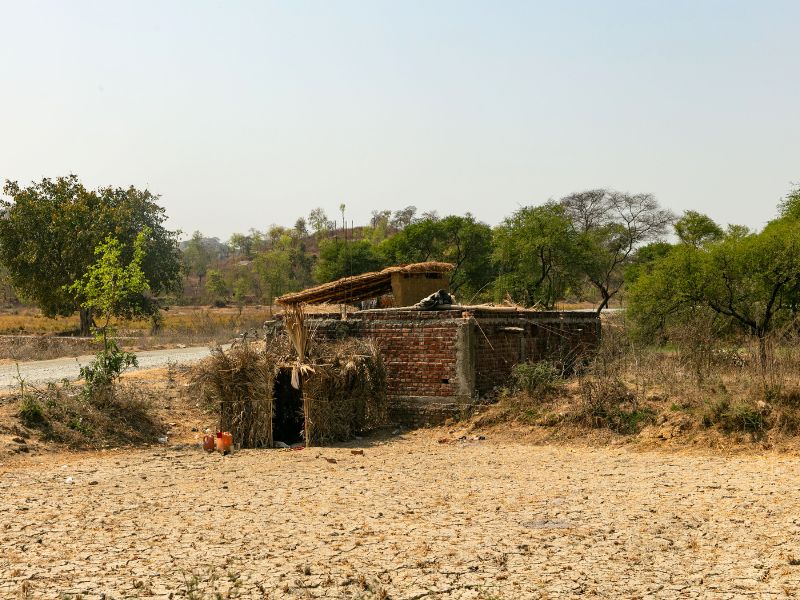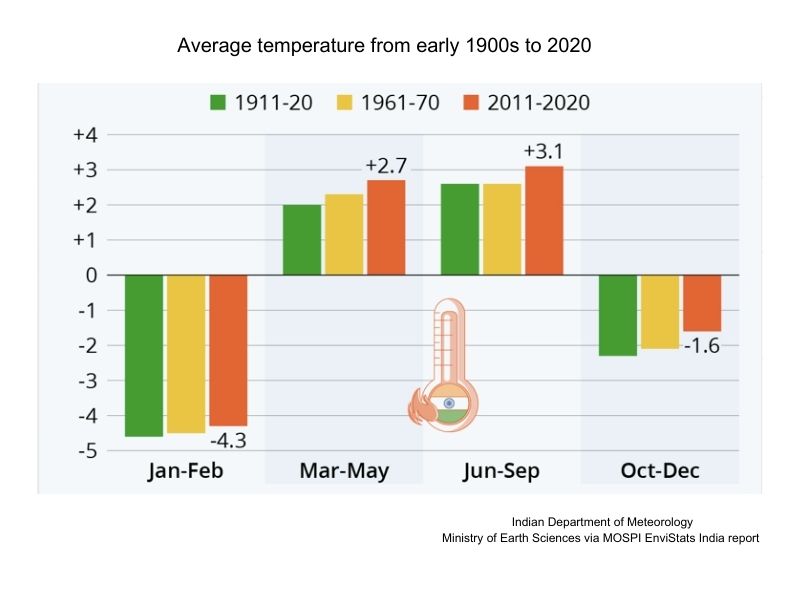The question is no longer merely theoretical: we have the power to destroy or preserve this biosphere. Our responsibility is immensely increased and we cannot turn away, saying it is not our concern.
Matthieu Ricard

Climate change has severe consequences on Earth and poses a global threat to all forms of life. Through this two-part report, we invite you to discover its impact in our areas of intervention: India and Nepal.
This year, India experienced the longest heatwave in its history. Climate change, defined by the United Nations as “long-term shifts in temperatures and weather patterns,” is the cause.

In several regions of the country, temperatures exceeded 45 degrees Celsius, reaching 50 degrees (122 Fahrenheit) in the North.
However, the maximum temperature tolerated by humans is between 40 and 50 degrees.
Beyond this, the body is at risk of malfunctioning, and the effects can be deadly.
Human Activity: The Main Driver of the Climate Crisis
Over Earth’s history, as explained by the UN, climate changes were primarily caused by natural phenomena such as solar activity fluctuations, or major volcanic eruptions.
However, since the beginning of the industrial era in the 19th century, human activities have become the main cause. As highlighted by Matthieu Ricard, in addition to promoting the emission of greenhouse gasses, humans consume the planet’s resources.
The report of the Intergovernmental Panel on Climate Change (IPCC), published in March 2023, has formally confirmed this human responsibility, with a 97% consensus. The comprehensive evaluations of the IPCC are written by hundreds of world-renowned scientists, with contributions from thousands of experts. It has been approved by the governments of all countries worldwide.
India is especially affected by the climate crisis due to its geographical position. Being close to the equator, it receives a significant amount of solar radiation each year.
Moreover, the country faces major challenges limiting its capacity to prepare for change, or to respond effectively.
These challenges include a high population density, rapid urbanization without adequate infrastructure, and significant inequalities.

The consequences of global warming are affecting many aspects of our lives. Here are the main impacts on the vulnerable Indian communities we support.
Significant Health Risks
Extreme heat poses serious public health risks. It promotes respiratory diseases, dehydration, headaches, and skin irritations. These symptoms can be particularly severe for those lacking resources, especially if left untreated.
This year, around 60 heatstroke deaths and 25,000 heat-related illnesses were reported in India between March and May 2024 (National Center for Disease Control). As deaths are not always reported in rural areas, the actual numbers are likely higher.

The heatwaves are not only uncomfortable, they are dangerous for our health. We are constantly thirsty and feel a burning sensation on our skin. Moreover, the air quickly becomes suffocating.
Kalmi Lohar, Social Motivator, Karuna-Shechen India
The Water Crisis
Climate change disrupts monsoon cycles and promotes extreme weather events such as droughts and floods.
Water shortages are becoming more frequent, affecting both its potability and its local availability.
We have also observed a 35% drop in water reservoir levels in India.
Access to water in India is a major challenge, impacting the activities and well-being of local communities.
Households and the agricultural sector are particularly affected by the water crisis, which also compromises food security. Harvests decline due to irrigation difficulties.

Facing these growing problems, it is crucial to adapt and find practical solutions to mitigate the impacts of climate change.
Working becomes extremely difficult, especially when it involves covering remote areas. The number of seeds we can distribute has also decreased due to the lack of water and extreme heat, which make conditions unsuitable for plant growth.
Kalmi Lohar
How Do We Adapt in the Field?
Our activities have been greatly affected, but the safety of field teams remains a priority.
The heat makes it difficult to reach villages during the day and poses health risks to our staff and to the communities they serve.
The pace of our awareness projects has adapted. Now, their workday starts very early in the morning and ends late in the afternoon.
As a result, our activities have slowed down, reducing the assistance provided. For example, educational programs were interrupted, as early childhood development centers and schools had to close.
Today, despite their reopening, attendance has dropped. Most parents keep their children at home to avoid heatstroke.
We commend the courage of Karuna’s field teams who, despite the difficult conditions, are determined to keep the programs running. They show great adaptability, and for that, we express our deep gratitude.
The intense summer heat has significantly impacted our ability to provide effective services. We suffer from heat exhaustion, and community participation has also decreased.
Rani Kumari, Community Health Mobilizer, Karuna-Shechen India

L’espoir d’un avenir sain

If we can learn, each one of us, around the world, to love nature, appreciate it, and take care of it with all our heart and from the deepest part of ourselves, then we can change many things in the world […]
Elizabeth Wathuti, climate activist
When the extreme heat subsides, the monsoon season begins. A formidable phenomenon, it brings new obstacles for populations who have no respite.
Community resilience is essential to adapt to the growing challenges of climate change. This mental capacity to recover in the face of adversity has already enabled the implementation of initiatives such as the construction of a pond in Silaighati.
Adopting sustainable eco-friendly behavior is also crucial. By integrating certain actions into our daily lives, we can reduce our environmental impact. It is also important to pass this on to the younger generation, who represent the future.
Karuna implements local programs to mitigate the effects of climate change, but sowing the seeds of a sustainable future is everyone’s business. It is our collective and individual responsibility to rethink our lifestyles, take action, and commit daily.
Let’s act together to strengthen the resilience of communities affected by climate change
Nepal, where we work with impoverished communities, is also particularly affected by the climate crisis. Between extreme heat, droughts, and fires, discover how these challenges impact the lives of Nepalese communities and how they cope in the second of our reports on extreme heatwaves in India and Nepal.
Ressources
- “Carte du monde, Inde”, Evasion Online ;
- “Changements climatiques”, United Nations ;
- “Extreme heat, gender, and access to preparedness measures: An analysis of the heatwave early warning system in Ahmedabad, India”, Science Direct, December 2023 ;
- “Heatwave: 56 heat-related deaths, 25,000 heatstroke cases reported in India from March to May”, Mint, June 2024 ;
- “ India Summer : Eight more die as India faces ‘longest’ heatwave”, BBC, June 2024.